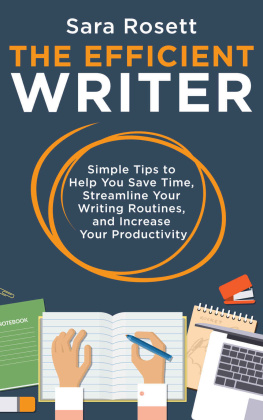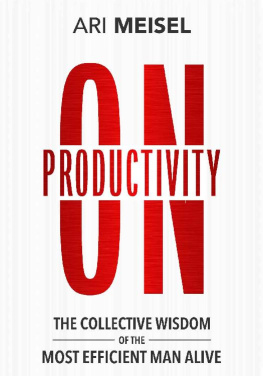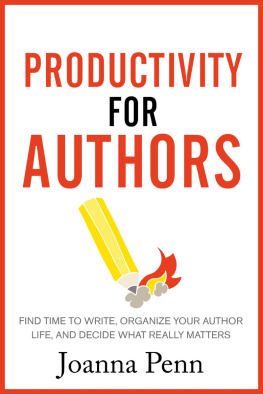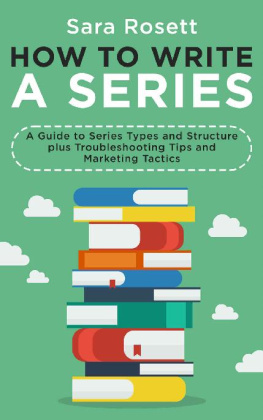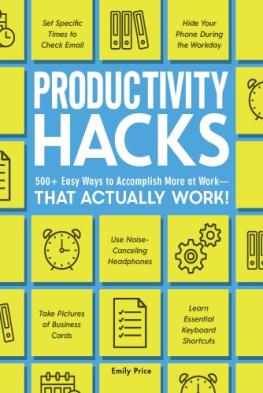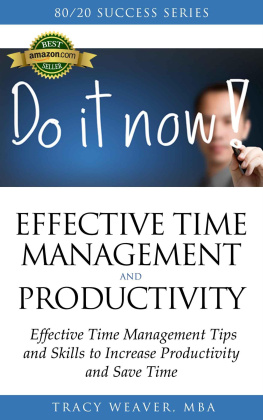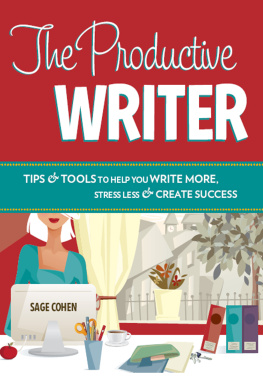Sara Rosett - The Efficient Writer: Simple Tips to Help You Save Time, Streamline Your Writing Routines, and Increase Your Productivity
Here you can read online Sara Rosett - The Efficient Writer: Simple Tips to Help You Save Time, Streamline Your Writing Routines, and Increase Your Productivity full text of the book (entire story) in english for free. Download pdf and epub, get meaning, cover and reviews about this ebook. year: 0, genre: Computer. Description of the work, (preface) as well as reviews are available. Best literature library LitArk.com created for fans of good reading and offers a wide selection of genres:
Romance novel
Science fiction
Adventure
Detective
Science
History
Home and family
Prose
Art
Politics
Computer
Non-fiction
Religion
Business
Children
Humor
Choose a favorite category and find really read worthwhile books. Enjoy immersion in the world of imagination, feel the emotions of the characters or learn something new for yourself, make an fascinating discovery.
- Book:The Efficient Writer: Simple Tips to Help You Save Time, Streamline Your Writing Routines, and Increase Your Productivity
- Author:
- Genre:
- Year:0
- Rating:4 / 5
- Favourites:Add to favourites
- Your mark:
- 80
- 1
- 2
- 3
- 4
- 5
The Efficient Writer: Simple Tips to Help You Save Time, Streamline Your Writing Routines, and Increase Your Productivity: summary, description and annotation
We offer to read an annotation, description, summary or preface (depends on what the author of the book "The Efficient Writer: Simple Tips to Help You Save Time, Streamline Your Writing Routines, and Increase Your Productivity" wrote himself). If you haven't found the necessary information about the book — write in the comments, we will try to find it.
Sara Rosett: author's other books
Who wrote The Efficient Writer: Simple Tips to Help You Save Time, Streamline Your Writing Routines, and Increase Your Productivity? Find out the surname, the name of the author of the book and a list of all author's works by series.
The Efficient Writer: Simple Tips to Help You Save Time, Streamline Your Writing Routines, and Increase Your Productivity — read online for free the complete book (whole text) full work
Below is the text of the book, divided by pages. System saving the place of the last page read, allows you to conveniently read the book "The Efficient Writer: Simple Tips to Help You Save Time, Streamline Your Writing Routines, and Increase Your Productivity" online for free, without having to search again every time where you left off. Put a bookmark, and you can go to the page where you finished reading at any time.
Font size:
Interval:
Bookmark:
T HE E FFICIENT W RITER
S IMPLE T IPS T O H ELP Y OU S AVE T IME , S TREAMLINE Y OUR W RITING R OUTINES , AND I NCREASE Y OUR P RODUCTIVITY
Sara Rosett
Sign up for Saras newsletter.
Copyright 2016 by Sara Rosett
All rights reserved. All trademarks and registered trademarks that appear in this book are the property of their respective owners. This book is for informational purposes only. The reader is responsible for carrying out due diligence regarding advice, products, and services contained herein.
INTRODUCTION
of making many books there is no end
Ecclesiastes 12:12
While that quote about the making of books is over two thousand years old, it is more relevant today than ever. In this age of e-publishing, there is literally no end to the books authors can write and publish.
Readers are devouring books, enjoying this new abundance of books, and authors are eager to meet this new demand, producing more content in short amounts of time.
Its a new pulp-fiction era. The algorithms favor new content, so authors are finding ways to squeeze more words into their word count each day. One writing subgenre has seen a surge in new titlesproductivity books. There are books to help you learn how to write faster, how to outline and plot so you can write your books more quickly, and even how to dictate your books to get more words on the page during those precious writing hours.
While those topics are extremely valuable, this book isnt about writing faster. Its about becoming more efficient in your writing life and streamlining all those writing-related tasks that eat into your writing time so that you have more time to do what you lovewrite.
How many times have you spent chunks of your writing time searching for the final version of a file? You need to make a quick change, but when you look at your files, there are several files with the same date. Is it Great American Novel Final, Great American Novel Final Final, or Great American Novel New Final?
Or you want to book an ad and spend considerable time gathering the facts about the bookthe ASIN or ISBN, the description (the most recent one), and the sale price in different countries.
If you take a few minutes to implement some routines and systems, you will save time in the long run. Think about your word count. As writers, we all know that if we write two hundred words a day we will have over seventy thousand wordsa first draft of a bookin a year. A couple of hundred words may not seem like a lot, but they add up. And any words are more than zero words. In the same way, five or ten seconds saved here and a minute or two saved there may not seem like a lot, but if you add them up at the end of a year, you could have several hours or more. And those are hours that could be spent writing, adding to your word count.
Nature versus Nurture
Some people are naturally more attuned to being neat and organized. Im not one of those people. I like the idea of being organized. In fact, organized people fascinate me. The protagonist in my first mystery series, the Ellie Avery series, is a professional organizernot because Im organized, but because I thought it was an interesting topic, and I wanted to be more organized myself. As a by-product of researching those books, Ive learned lots of organizational skills that Ive applied to my writing routines. So even if you dont have a natural talent for organization and efficiency, they are skills that can be learned.
What I Wish I Had Known
Ive been writing for fifteen years. I landed a traditional deal ten years ago for my organizer sleuth mysteries, a series that Im still writing for the same publisher. Books nine and ten are under contract. For the past three years, Ive also self-published two additional series, another cozy mystery series and a mystery/heist series with elements of classic romantic suspense. The tips in this book are things that I have learned through trial and error. While each authors book is unique and no one else can write a book exactly like yours, there are plenty of routine (and mundane) tasks that all self-publishing authors have to do. I dont see a reason why every author should have to reinvent the wheel with each task.
Take word count. I wanted to track my word count, so I created a spreadsheet. You could create your own spreadsheet, but why not use mine? Ive done the initial setup. You can customize it as you like. It will be in the Appendix along with lots of other great templates.
The Efficient Writer contains more than my tips. Ive also included some of my favorite shortcuts and time-savers from other authors and creatives, which are cited in the Resources section in the Appendix. Im a process junkie. I want to know why something works, and Im a bit of an efficiency nut as well. If theres a way to streamline something, it makes me happy. As I read blogs and articles, scan forums, and listen to podcasts, I collect tips for streamlining routines and increasing efficiency and productivity. I like to hear how other authors do things. Whenever I glean a good tidbit from other authors and creatives, I try to apply it to my writing routines. Its that principle of not reinventing the wheel. In short, The Efficient Writer is a book of all the things that I wish I had known.
The Efficient Writer is divided into three sections related to the main areas that a writers life naturally breaks down into: writing, formatting and publishing, and marketing. Feel free to dip into whichever section youre working on now. The tips arent chronological. You can pick and choose which ones to try in your writing routines. To help you get started, Ive included a suggested action step after each tip.
Before we begin, a couple of tips about the tips:
Start Small
Dont try to implement all the tips at once.
One thing I have learned from my organizing research is that you want to start small. Take a big task and break it down into smaller tasks. Pick one section or a couple of tips and apply those. Later, add in a few of the other ideas. Small, incremental changes will add up, and youll have more time to write.
Macro- versus Microchanges
Some of these tips are on the microlevelsmall changes that may seem insignificant, but little changes can have big impacts over time. Dont write off the microchanges just because they seem insubstantial. Give them a try.
Technology is Great, But
For many of the tips in this book there are apps and websites that can help you, but Ive tried to keep it as simple as possible. Technology is great, but figuring out the bells and whistles of a new app or website can actually slow you down. Sometimes old school is the way to goa pen and paper work just fine to make to-do lists, for example. I will list some great technology that can help you become more efficientjust dont get so swept up in that new tech that you obliterate your writing time.
The exception to this bit of advice is Scrivener, a writing software that does take time to master, but in the end the benefits of using it outweigh the long learning curveat least in my opinion. Since many writers use Scrivener, some of these tips are Scrivener-specific, but if youve never used it, dont worry, there is a free trial for the software, and I have some easy start tips for Scrivener.
So on to the tips. Were starting with the basicsfinding time to write and squeezing the most out of that time.
WRITING
Just get it down on paper, and then well see what to do with it.
Maxwell Perkins
Most writers dont have a shortage of ideas. My wish list of books to be written continues to grow. The struggle is to get those ideas, those words, out of our heads and onto the page. The Writing Section of
Font size:
Interval:
Bookmark:
Similar books «The Efficient Writer: Simple Tips to Help You Save Time, Streamline Your Writing Routines, and Increase Your Productivity»
Look at similar books to The Efficient Writer: Simple Tips to Help You Save Time, Streamline Your Writing Routines, and Increase Your Productivity. We have selected literature similar in name and meaning in the hope of providing readers with more options to find new, interesting, not yet read works.
Discussion, reviews of the book The Efficient Writer: Simple Tips to Help You Save Time, Streamline Your Writing Routines, and Increase Your Productivity and just readers' own opinions. Leave your comments, write what you think about the work, its meaning or the main characters. Specify what exactly you liked and what you didn't like, and why you think so.

